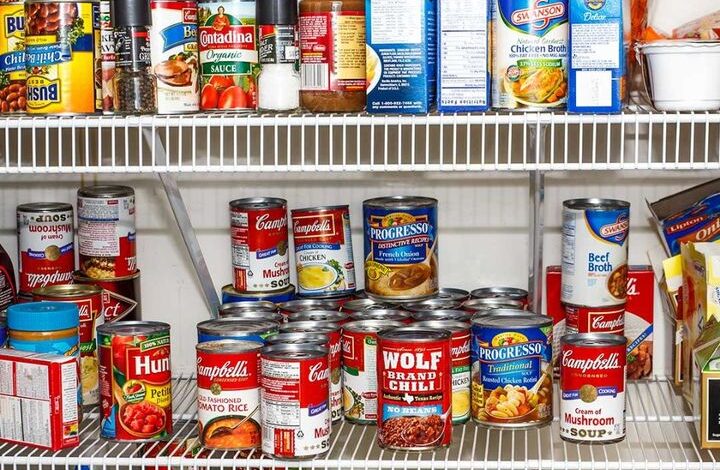I didn’t know about all the items on this list!

The dates you see printed on food packaging can sometimes be a bit confusing. Often, these dates are more about the quality of the food rather than its safety. For canned goods, you’ll usually find “best by” or “use by” dates. These are suggestions from the manufacturer about when the food will taste and have the best texture. However, many canned foods can still be safely eaten well after these dates, as long as they have been stored properly.
The Science Behind the Indefinite Shelf Life of Some Canned Foods
Certain foods possess natural characteristics that allow them to remain edible for a very long time. Factors like having very little water, a high concentration of salt or sugar, and the absence of significant amounts of fats and oils are key to their preservation. While these items might experience slight changes in flavor or texture over a long period, they generally remain safe to eat.
Key Factors That Contribute to the Long Life of Canned Foods
Several elements work together to give certain canned foods their remarkable shelf life. One crucial factor is the “airtight sealing” of the can. This prevents any harmful microorganisms from getting inside and spoiling the food. Another important process is “sterilization,” where the canned food is heated to a temperature that kills bacteria and enzymes that could cause spoilage. Additionally, some canned foods contain preservatives, and some foods naturally have their own “preservative properties,” which help them last longer.
Best Practices for Storing Canned Foods to Maximize Their Longevity
To ensure your canned foods last as long as possible, it’s important to store them correctly. Keep them in a “cool, dry place away from direct sunlight and temperature fluctuations.” It’s also important to “avoid denting or damaging the cans, as compromised seals can lead to spoilage.” Make it a habit to “regularly inspect your stored canned goods for signs of corrosion or bulging, which indicate potential contamination.”
Knowing the Potential Risks of Eating Canned Foods Past Their Prime
While many canned foods can last for a very long time, it’s important to be aware of potential risks. Eating canned goods that have gone bad or haven’t been stored properly can lead to foodborne illnesses. Be sure to “keep an eye out for signs of spoilage, such as an off odor, unusual color, or a damaged can, and when in doubt, discard the item to avoid any health risks.”
The Health Advantages of Long-Lasting Canned Foods
Non-perishable canned foods offer several health benefits. They often “retain their nutritional value over time and provide essential vitamins and minerals.” These foods can be a “reliable source of nourishment during emergencies or when fresh produce is not readily available, making them indispensable in balanced diets.”
Comparing Canned Foods to Fresh Foods Nutritionally
While fresh foods are often praised for their taste and texture, canned foods can be surprisingly nutritious. “The canning process locks in nutrients, and some canned foods may even have higher levels of certain vitamins and minerals compared to their fresh counterparts.” However, it’s worth noting that “the added sodium and preservatives in some canned products should be consumed in moderation.”
The Top 15 Canned Foods Known for Their Exceptional Shelf Life
When thinking about stocking up on foods that can last for very long periods, certain canned items are excellent choices because of their longevity and nutritional content. Here are 15 canned foods that, when stored properly, can essentially last indefinitely:
- Canned Beans: Beans are a very nutritious food, full of “protein, fiber, and vitamins.” When canned, “beans can last for years.” Their lack of dairy or meat helps them stay good for a long time, making them a great item to keep in your pantry.
- Canned Corn: Corn that is canned can last for a very long time. It’s a good source of “fiber and vitamins,” and the canning process helps to keep many of its nutrients intact.
- Canned Carrots: Canned carrots are a convenient way to enjoy this healthy vegetable even when it’s not in season. Carrots keep much of their “beta-carotene content, even through the canning process.”
- Canned Peas: Similar to corn and carrots, canned peas can last a long time in your pantry. They are an easy way to add a green vegetable to your meals, providing “fiber, vitamin C, and plant-based protein.”
- Canned Tomatoes: Tomatoes are particularly well-suited for canning, which helps to keep their “flavor and nutrients, including lycopene,” which might even become easier for your body to use after canning.
- Canned Pumpkin: A popular ingredient for fall recipes, canned pumpkin is great for more than just pies; it can also be used in soups and baking. It’s “packed with vitamins, fiber, and antioxidants” and stays good for a long time when canned.
- Canned Fish (Tuna, Salmon, Sardines): Canned fish like tuna, salmon, and sardines are excellent sources of “protein and omega-3 fatty acids.” They typically have one of the longest shelf lives among canned goods.
- Canned Chicken: A great source of “protein,” canned chicken can last for many years on your shelf. It’s a convenient and already cooked option for quick meals.
- Canned Beef: Similar to canned chicken, canned beef is another food rich in “protein” that, when stored correctly, can last for many years, making it a practical choice for emergency food supplies.
- Canned Chili: Whether it’s chili con carne or vegetarian chili, when canned, it can provide a satisfying meal with a very long shelf life thanks to the “high acidity and preservative nature of its ingredients.”
- Canned Coconut Milk: While it might not last quite as long as some other canned items, canned coconut milk can still be stored for years and is a key ingredient in many Asian and tropical dishes.
- Canned Soups: Many different kinds of canned soups can be stored for years. However, how long they last can depend on what’s in them; soups without cream or large pieces of meat tend to last longer.
- Canned Stews: Like soups, canned stews are already cooked and ready to eat, packed with nutrients and made for long-term storage.
- Canned Fruit (Peaches, Pears, Pineapple): Canned fruits can keep their “flavor and nutrients for an extended period.” They are a great way to enjoy fruit even when it’s not in season.
- Canned Spaghetti Sauces: Because they are “highly acidic with preservatives,” canned spaghetti sauces can maintain their quality for years, ready to be used quickly for a simple meal.
In Conclusion: Getting the Most Out of Your Canned Food Stockpile
While the idea of food that never goes bad might seem unbelievable, the canned foods listed above show that it is indeed possible to have a pantry that can last for a very long time. By understanding which foods have this long shelf life and knowing how to store them properly, you can ensure you have a dependable and nutritious supply of food ready for any situation.




